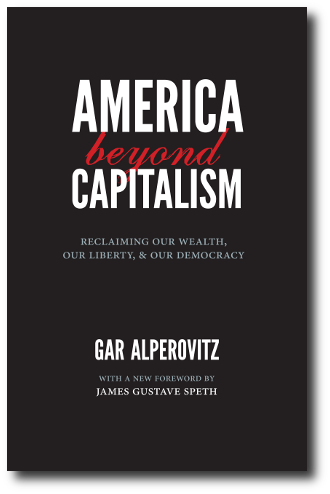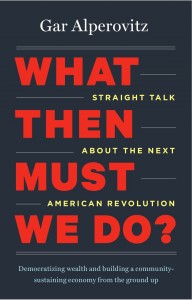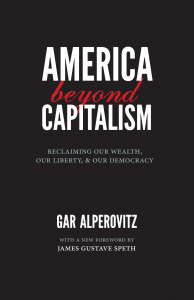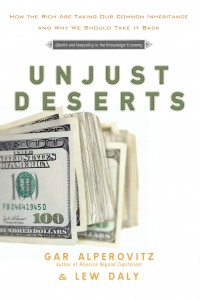Originally published in Aljazeera America on January 12, 2015.
Whether or not one agrees with the decisions taken by our political leaders who sent them off to war, it’s undeniable that the veterans of the various post-9/11 wars are suffering. The nearly three million veterans of Iraq and Afghanistan who have returned to civilian life are afflicted with an official unemployment rate of around 9 percent — substantially higher than the overall rate of 5.6 percent. Another half million have the left the labor force entirely. Many struggle with poverty, foreclosure and homelessness brought on by an anemic and uneven recovery and compounded by the mental and physical scars of war.
The plight of veterans of recent wars who continue to fall through the social safety net offers a unique opportunity to reimagine the way government provides for the welfare of its citizens. Too often discussions concerning the provision of basic needs for Americans get tied up in questions of desert: The “undeserving” poor see their lifeline slashed to incentivize them to pull harder on their own bootstraps. But only the most callous among us would find it easy to disown the obligation we owe to those who have demonstrated willingness to put their bodies in the line of fire on our behalf. Veterans offer a chance to think clearly about how best we can help those in need — and if the primary problem we must solve is that far too many veterans lack an income to support themselves, why don’t we just provide it to them?
Around the world today there is a growing discourse of a guaranteed annual income, but the idea is hardly new. The concept of a basic income — whether as an unconditional payment or a guarantee that would top off whatever is earned to a level adequate to meet basic human needs — has enjoyed surprising support from both ends of the political spectrum. The free-market evangelists Friedrich Hayek and Milton Friedman both endorsed it, as did Martin Luther King, Jr. and liberal economist John Kenneth Galbraith. In 1976 Hayek, for instance, wrote, “There is no reason why in a free society government should not assure to all protection against severe deprivation in the form of an assured minimum income.”
In his final book “Where Do We Go From Here: Chaos or Community?” Martin Luther King, Jr., wrote that “the solution to poverty is to abolish it directly by a now widely discussed measure: the guaranteed income.” Galbraith, for his part, argued in the mid-1960s that we can easily afford an income floor and pointed out that this was “not so much more than we will spend during the next fiscal year to restore freedom, democracy and religious liberty, as these are defined by the experts, in Vietnam.”
Veterans are an obvious place to begin for other reasons as well: The Veterans Pension already guarantees a modest minimum income to returning servicemen and servicewomen unable to work due to disability or age. Currently, to qualify, a veteran must have served on active duty (including at least one day during wartime), be older than 65 or disabled and have an income of less than approximately $13,000 (for a single veteran without dependents). The road to a guaranteed income would begin by revamping this system. Simply removing the age and disability requirements from the existing pension system could guarantee a minimum income that would bring all the veterans of recent wars above the poverty line at a maximum cost of roughly $5.5 billion a year.
This is a mere one-thirtieth of the roughly $170 billion spent on the wars in Iraq and Afghanistan each year from 2007 to 2011 (the height of those conflicts) and one-twelfth of what was spent to bail out the insurance company AIG during the 2008 financial crisis. Even topping off the salary of the veterans of all the various wars on terror to a comfortable $50,000 a year would cost at most $70 billion (with actual costs being considerably less). Moreover, as the income floor rises, the need for other social services decreases, further reducing costs — a key point emphasized by conservative advocates for basic income legislation.
If some are uncomfortable paying veterans for “doing nothing, ” an alternative proposal for a sensible contemporary safety net would be to implement a job guarantee, with unemployed and underemployed veterans paid living wages by a federal government willing to act as an employer of last resort. Cash-strapped municipal governments or local non-profits could easily find ways to put the labor of hundreds of thousands of otherwise unemployed veterans to use rebuilding America’s communities.
Seeing veterans struggle to keep themselves and their families housed and fed in the wealthiest country in the history of the world is a tragic reminder of our failure of will and of compassion. It’s time to get serious about real alternatives, the kind thoughtful conservatives and liberals once were willing to demand. In the welfare of veterans, conservatives and liberals might even find a tiny bit of common ground to stand on in the new year.
 AMERICA BEYOND CAPITALISM
AMERICA BEYOND CAPITALISM



 Agenda
Agenda  Posterboard
Posterboard 